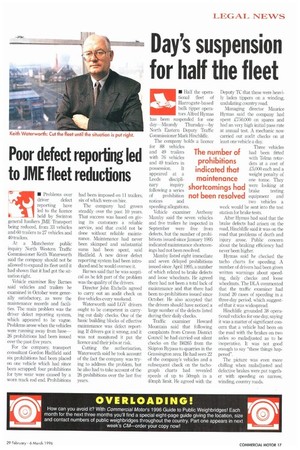Poor defect reporting led to JME fleet reductions
Page 19

If you've noticed an error in this article please click here to report it so we can fix it.
• Problems over driver defect reporting have led to the licence held by Swinton general hauliers JME Transport being reduced, from 33 vehicles and 60 trailers to 27 vehicles and 40 trailers.
At a Manchester public inquiry North Western Traffic Commissioner Keith Waterworth said the company should not be allowed to expand its fleet until it had shown that it had got the situation right.
Vehicle examiner Roy Barnes said vehicles and trailers he examined in October were generally satisfactory, as were the maintenance records and facilities. The main problem was the driver defect reporting system, which appeared to be vague. Problems arose when the vehicles were running away from base26 prohibitions had been issued over the past five years.
For the company, transport consultant Gordon Hadfield said six prohibitions had been placed on one vehicle which had since been scrapped: four prohibitions for tyre wear were caused by a worn track rod end. Prohibitions had been imposed on 11 trailers, six of which were on hire.
The company had grown steadily over the past 10 years. That success was based on giving its customers a reliable service, and that could not be done without reliable maintenance. Maintenance had never been skimped and substantial sums had been spent, said Hadfield. A new driver defect reporting system had been introduced and he would oversee it.
Barnes said that he was sceptical as he felt part of the problem was the quality of the drivers.
Director John Etchells agreed to carry out an audit check on five vehicles every weekend.
Waterworth said WV drivers ought to be competent in carrying out daily checks. One of the basic building blocks of effective maintenance was defect reporting. If drivers got it wrong, and it was not monitored it put the licence and their jobs at risk.
Cutting the authorisation, Waterworth said he took account of the fact the company was trying to address the problem, but he also had to take account of the 26 prohibitions over the last five years.




































































































